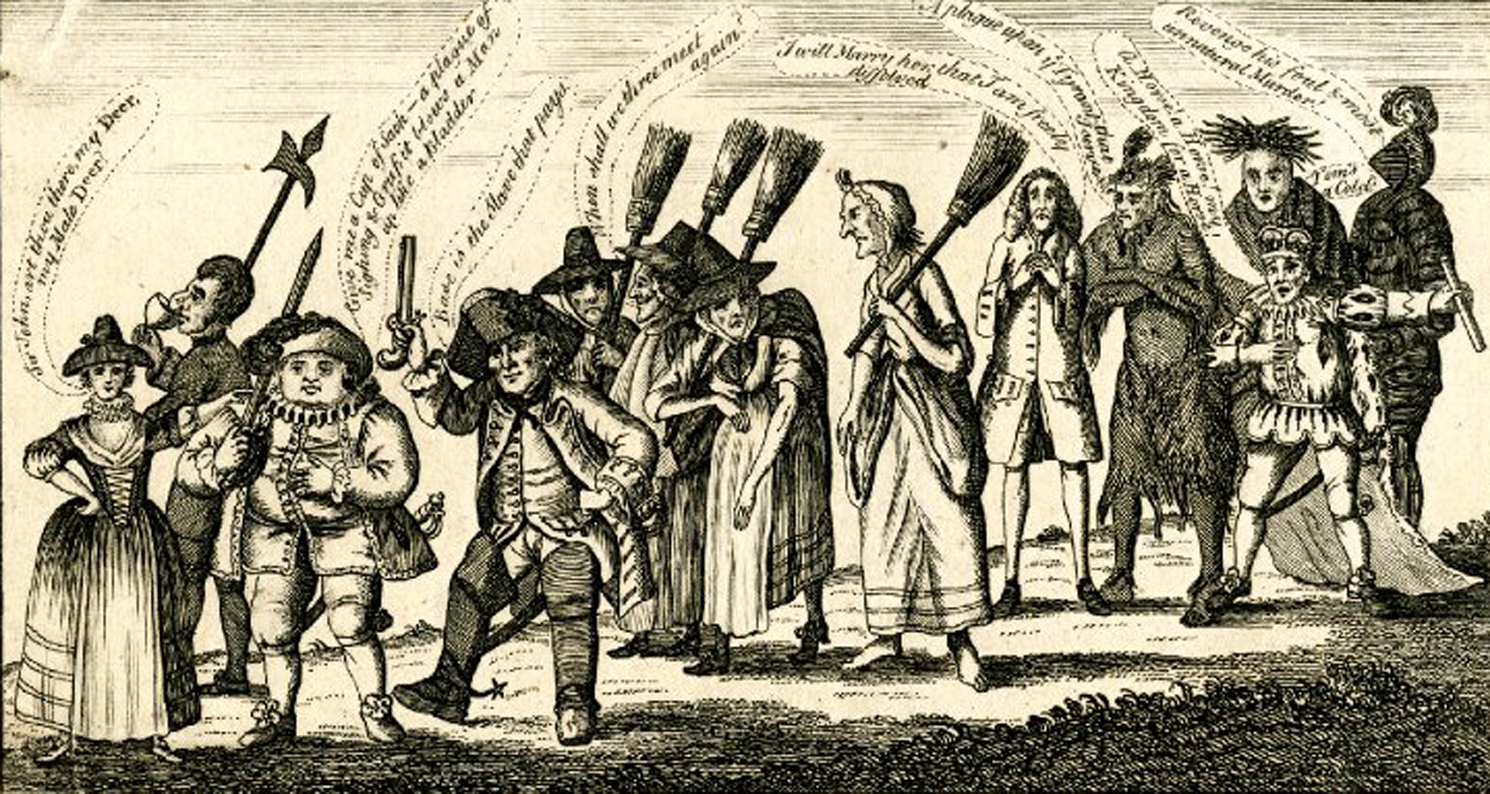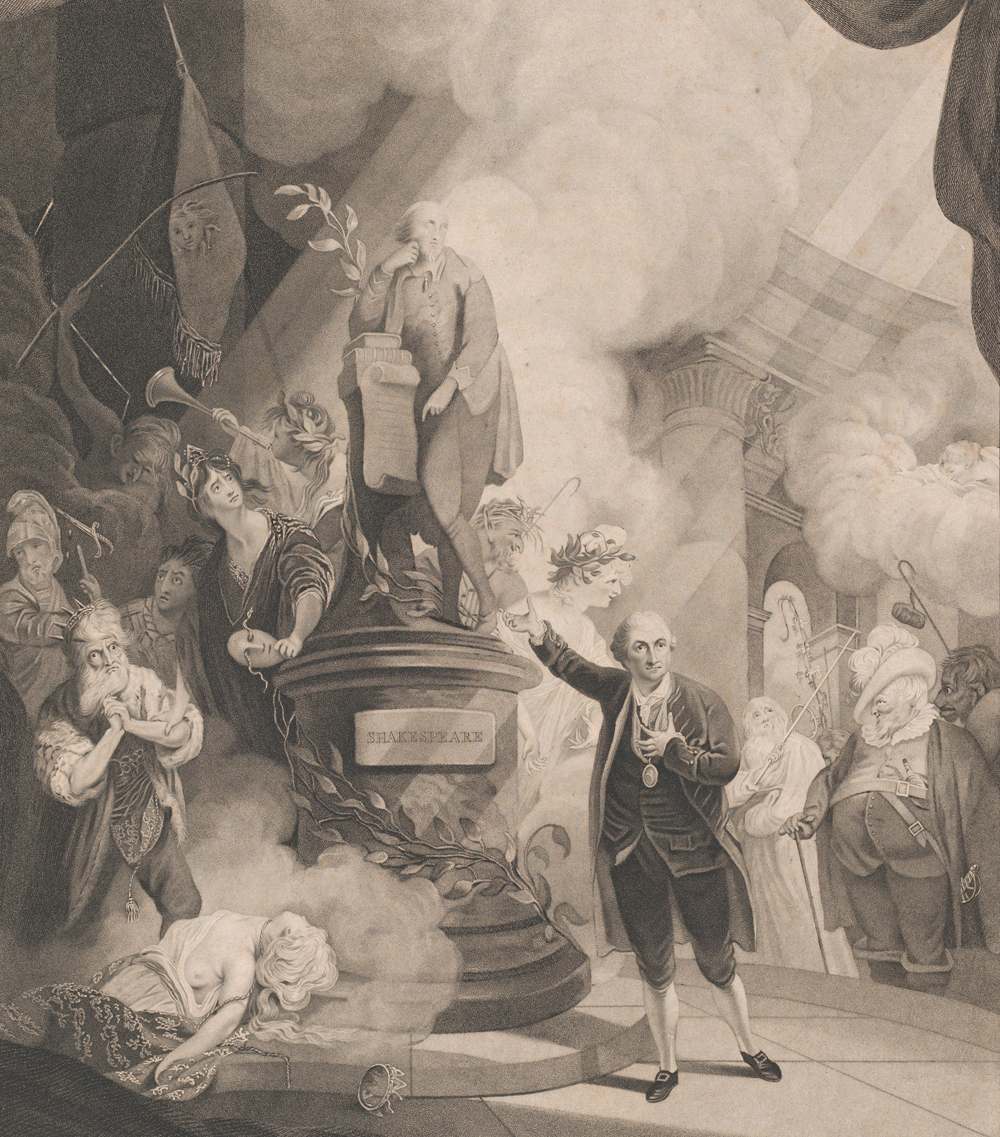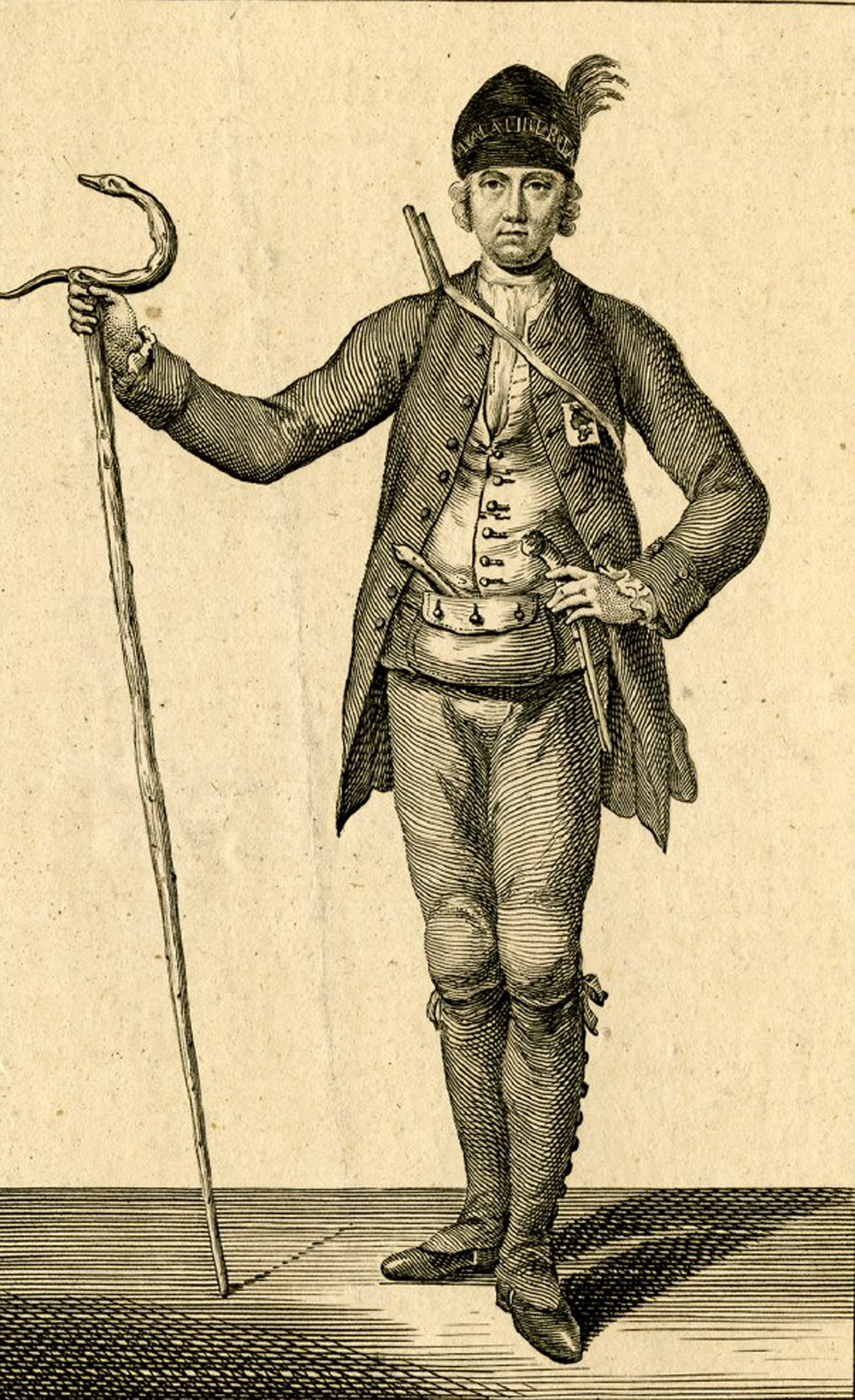
The Procession at the Jubilee at Stratford upon Avon, c. 1769. © The Trustees of the British Museum.
James Boswell was “in great uneasiness.” Only forty miles out from the Shakespeare Jubilee, he suddenly realized that he’d mislaid his purse, his pocket watch, and the letter from his stern cousin Peggie accepting his offer of marriage. He thought about sending back for them, but between his “anxiety” and thinking “most fervently about my dearest,” he decided to turn around and search for them in person. Virtue was to blame. Since his betrothal five weeks earlier, he had promised himself to be more vigilant against the urges he’d struggled with since childhood, but his desires unskinned him. Women were his weakness, and although he always deeply regretted giving in, he felt that sex brought him closer to perfection, making him feel more confident, masculine, “humane, polite, [and] generous.” While resting at the Angel Inn a few hours earlier, it had taken every ounce of resolution to rebuff the attentions of the beautiful Miss Reynolds, refusing her invitation to bed and contenting himself with simply drawing his hand “gently along her yellow locks” and encouraging her to become a milliner. Escaping back into the night to post the final stage to Stratford-upon-Avon, the pleasant tension of this encounter gave way to a fear that some highwayman might leap on the step of his carriage and press a pistol to his chest. Hiding his purse in the upholstery, he allowed himself to relax, sleepily changing carriages at Woodstock and again at Chipping Norton.
The Shakespeare Jubilee—“an elegant and truly classical celebration of the memory of Shakespeare,” as Boswell called it—encompassed three days of songs, balls, and pageants in September 1769, organized by the actor David Garrick and culminating in Garrick’s bravura reading of a dedicatory ode over a statue of Shakespeare he had gifted the town. Critics have observed that Garrick’s jubilee had remarkably little Shakespeare for a festival in his honor. Not a single scene from his plays was performed, let alone an entire play, and his work was present only in fragments and allusions, as song lyrics and quotations, as allegorical images painted on the backlit transparencies that illuminated the windows of the town hall, or in the costumes of the people who dressed for a parade that never took place. While this may seem like an oversight, it was part of a larger project that sought to emphasize the spirit of Shakespeare over the body of his work. For Garrick, as for many who considered themselves cultured souls in the eighteenth century, the genius of Shakespeare was too potent to be confined merely to the page. Only by untethering the idea of Shakespeare from his words—words which could be confusing and contradictory—was it possible to experience his genius more fully. In celebrating Shakespeare outside the walls of a theater, Garrick invited his revelers to find the bard all around themselves, like a literary Holy Ghost giving voice to the passions and animating the soul. By presenting Shakespeare in the town of his birth, with its timber-framed houses, reedy riverbanks, and open fields, he showed them a writer specifically associated with rural England at a time when nostalgia for the pastoral was growing in the wake of the first phase of the Industrial Revolution.

At first Boswell had not intended to go to the jubilee at all, planning instead to travel down from Edinburgh to place himself under the care of the London physician Gilbert Kennedy, patentee of the renowned Lisbon Diet Drink, a miracle beverage composed of sarsaparilla, licorice, and guaiac wood that was supposed to cure venereal disease. He was suffering from the effects of sex with a prostitute in Dublin a few months earlier, and this was just the latest attempt at a venereal cure. One such treatment had left a testicle horribly swollen for four months—an especially traumatic episode that plagued him for years in the form of a nightmare in which his surgeon, Andrew Douglas, peered at his penis and said, “This is a damned difficult case.” Determined never to endure such agony again, he bet three friends a guinea that he could remain pox-free for the next three years. Just ninety days later, he paid up after catching it again. From that point on, his testicle became a bellwether of his overall health that he would eye cautiously whenever feeling even slightly unwell.
Boswell’s biography is a litany of self-imposed deadlines to become better, purer, stronger, soberer. Take, for example, the matter of baths. “I like exceedingly to wash my feet in warm water,” he had written in 1762, while studying the law in Utrecht. “But if I receive so much delight from washing my feet, how great must have been the luxury of the Romans, who solaced thus their entire bodies.” Having concluded that a warm bath was indeed a “most agreeable kind of luxury,” he quickly pivoted to denounce luxury as “very dangerous.” “Above all things,” he wrote, “a young man should guard against effeminacy. I would advise him to avoid warm baths and accustom himself rather to the cold bath, which will give him vigor and liveliness.” It was a pattern much repeated in Boswell’s life—desirously submitting to sensuousness before rearing back in reproof, a perpetual disappointment to himself.
As Boswell got closer to London, the talk and excitement around the jubilee became so clamorous that the very idea of it, he wrote, “makes all my veins glow.” Such were Garrick’s connections that his jubilee was guaranteed to attract a powerful mix of aristocrats and politicians, fashionable salonnières and literary types. It would be heaven for Boswell, who liked nothing more than smart company and befriending people of influence. Like the sex he craved, the acquaintance of the wellborn and the notable conferred a sense of his own value, helping to defend against the debilitating “hypochondria” and depression that had afflicted him intermittently since childhood. Thanks to the recent publication of his Account of Corsica, a memoir of his travels and acquaintance with General Pasquale Paoli, the leader of the Corsican independence movement, he was enjoying a period of what he called “newspaper fame” and soaking up the attention that being a well-regarded author afforded. But success had not been effortless, and Boswell had ensured it wouldn’t be left to chance alone. Ever since returning from Corsica, he had conducted a campaign of correspondence, writing letters to politicians and sending anonymous paragraphs to the papers to keep Corsican news to the fore. Much of it was entirely made up, such as the travels of “Signor Romanzo,” a courtier whose visits to foreign capitals and the presence chambers of European plenipotentiaries were faithfully reported by Boswell from his Scottish desk. If he could somehow co-opt the jubilee, the most significant cultural event for many years, then his attendance would surely lead to more press, more celebrity, and further social triumph.
After a long night of travel, his first stop was Holy Trinity Church, the site of Shakespeare’s tomb, where he saw a performance of Thomas Arne’s Judith, an oratorio concerning the decidedly non-Shakespearean affair of a pious widow who beheads her Assyrian kidnapper. Afterward was a meal at the Rotunda, the vast wooden amphitheater built solely to host events for the jubilee; it was still under construction as the guests sat down for dinner.
Close to three thousand people attended the jubilee, among them two dukes, numerous lords, several politicians (including former prime ministers Lord North and Charles James Fox), much of literary London (with the notable exception of Samuel Johnson, who considered the jubilee to be a folly), and representatives of the first families of England. The opportunity to meet so many influential people thrilled Boswell, and as workmen banged nails into the roof above, he greeted friends and fell into conversation with “a most agreeable little woman” named Mrs. Sheldon. Many guests reported a spirit of amorous play at the jubilee—couples were caught in the hay barns, while country parents sent their daughters in hope of a cosmopolitan match. “Wenches!” wrote one reveler. “Never was any paradise so plentifully or beautifully inhabited as here at this time.” In the midst of such flirtation, “I recollected my former inconstancy,” confessed Boswell to his diary, “my vicious profligacy, my feverish gallantry, and I was terrified that I might lose my divine passion…I prayed devoutly to heaven to preserve me from such a misfortune.” Pulling himself away from Mrs. Sheldon, he moved closer to the orchestra but found little respite; the principal performer was “that beautiful, insinuating creature, Mrs. Baddeley,” a Drury Lane actress considered to be the most seductive performer of her day. Exhausted and confused, he returned alone to the room he had rented from “a good, motherly woman,” who brought him a bowl of negus, a mixture of warm port and water. Comforted, “I told her that perhaps I might retire from the world and just come and live in my room at Stratford.”

The second day began with a volley of cannon fire and a torrent of rain so insistent that the planned procession of Shakespearean characters had to be cancelled. The jubilee’s main event, the delivery of Garrick’s ode, was universally considered to be a triumph despite the tempestuous weather that almost blew the doors of the Rotunda off their hinges. Garrick’s performance set Boswell in raptures—he likened it in nobility to an oration from ancient Athens or Rome—yet it did not distract him from his real objective for the day: furthering his own reputation. His time was spent schmoozing with the publisher of the Public Advertiser and composing verses that he hoped to have printed in time to pass around to the fifteen hundred guests who would be attending that evening’s masked ball. Boswell of course planned to attend as a Corsican; having left his genuine Corsican attire in Edinburgh, he had patched a passable suit together in London before setting off for Stratford consisting of a scarlet waistcoat and breeches and a coat of dark cloth onto which he had sewn a Moor’s head, the crest of Corsica. His black hat had been made in haste by Mr. Dalemaine, a Covent Garden tailor, and embroidered with the words Viva la Libertà in gold with a blue feather and cockade, “so that it had an elegant, as well as a warlike appearance.” The costume was completed with black spatterdashes laced up to his knees, his hair plaited into a single strand and tied with blue ribbon, and a staff with the handle carved in the form of a bird’s head. “It is a jubilee staff,” he told the shopkeeper when he found it. “That bird is the bird of Avon.”
Boswell made sure that most of the guests had arrived at the ball before making his own entrance, paying his respects first to Garrick and then to Garrick’s wife, the Austrian dancer Eva Maria. He debated the meaning of liberty with Lord Grosvenor (dressed as a Turk), before reacquainting himself with the lovely Mrs. Sheldon, feeling confident enough to dance with her now that he was wearing dagger and pistols, items he referred to as his “armor.” At two in the morning, a small Scots boy arrived with a proof copy of the verses he had written earlier that day. Trying but failing to capture the attention of everyone within earshot, Boswell managed at least to collar Garrick, to whom he recited his own ode: “From the rude banks of Golo’s rapid flood / Behold a CORSICAN!” The poem went on to describe the Corsican narrator’s pilgrimage in honor of Shakespeare, and his high regard for Garrick, before concluding,
But let me plead for Liberty distrest,
And warm for her each sympathetick breast:
Amidst the splendid honours which you bear,
To save a sister island! be your care:
With generous ardour make us also free,
And give to CORSICA, a noble JUBILEE!
Shakespeare, Garrick, Corsica, the jubilee—a combination that made sense only to Boswell but upon which he was determined to capitalize. As journalists and correspondents rushed to print their accounts of the jubilee, Boswell made sure to have his own costumed picture engraved for the London Magazine by the artist Samuel Wale, along with a full description of his appearance. “One of the most remarkable masks upon this occasion,” said the article, “was James Boswell Esq.” Of course, he wrote the entire article himself, and its inclusion may have helped him decide to buy a sixth share in the magazine the following month.
But first it was time to leave, and the rest of the evening was spent trying to avert disaster as the unceasing rain found its way into every nook of the imperfect Rotunda until it had pooled shin-deep. A general cry went up calling for all to abandon the building before the entire thing floated away, and the guests had to struggle across a flooded meadow filled with submerged ditches into which several of them briefly disappeared. “We did not get home,” wrote James Boswell, “till past six in the morning. I got about three hours’ sleep. Then rose and had some breakfast.” The rain had not stopped, and with the untinseled clarity of the profoundly hungover, he saw “the true nature of human life began now to appear. After the joy of the jubilee came the uneasy reflection that I was in a little village in wet weather and know not how to get away.” Like many attendees, he declined to stay for day three, taking himself back to London in one of the many overstuffed conveyances that choked the roads like a convoy of refugees.
It had been good and it had been bad—not dissimilar, reflected Boswell, from eating an artichoke whole. “We have some fine mouthfuls,” he said, “but also swallow the leaves and the hair, which are confoundedly difficult of digestion.”